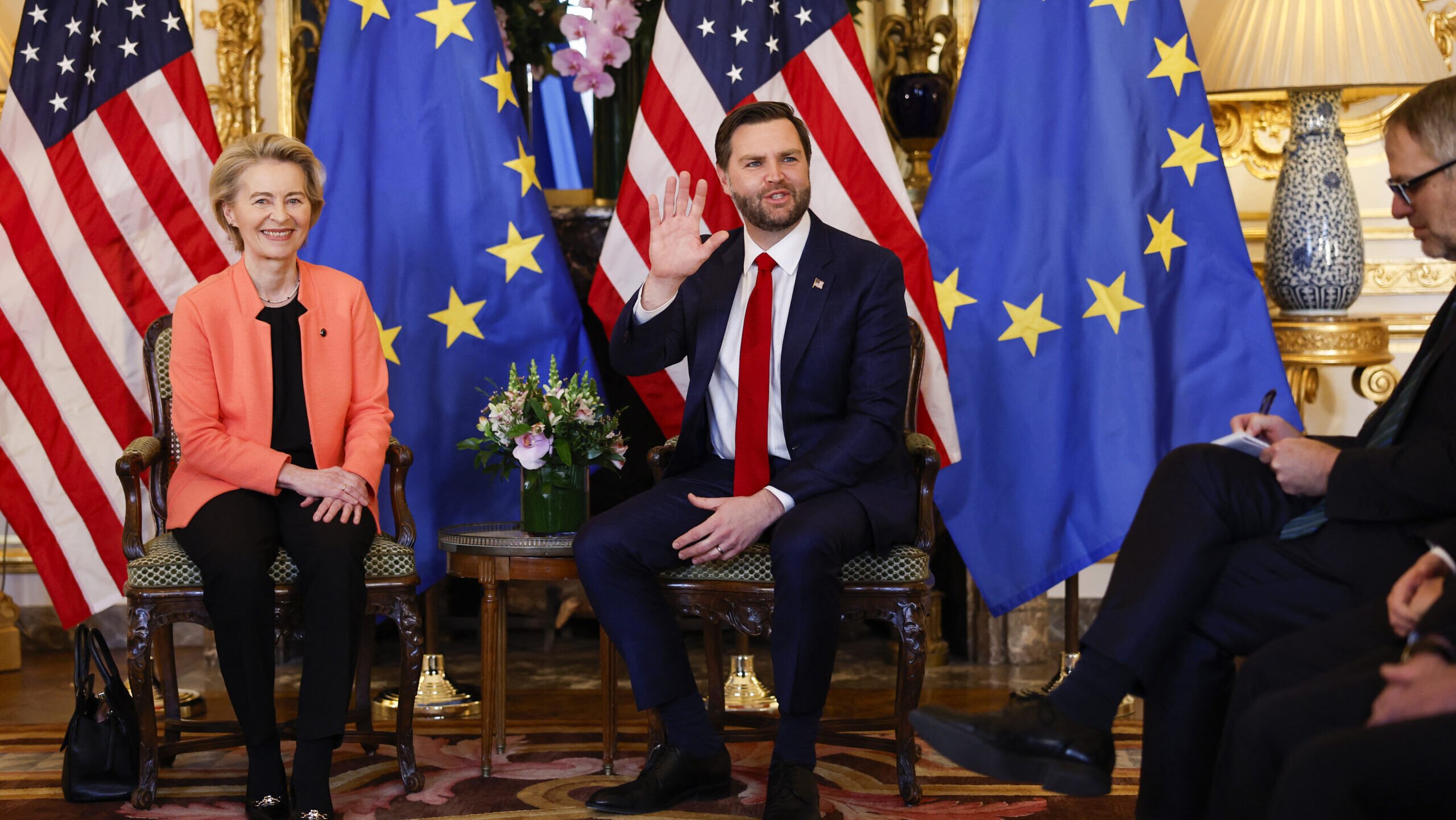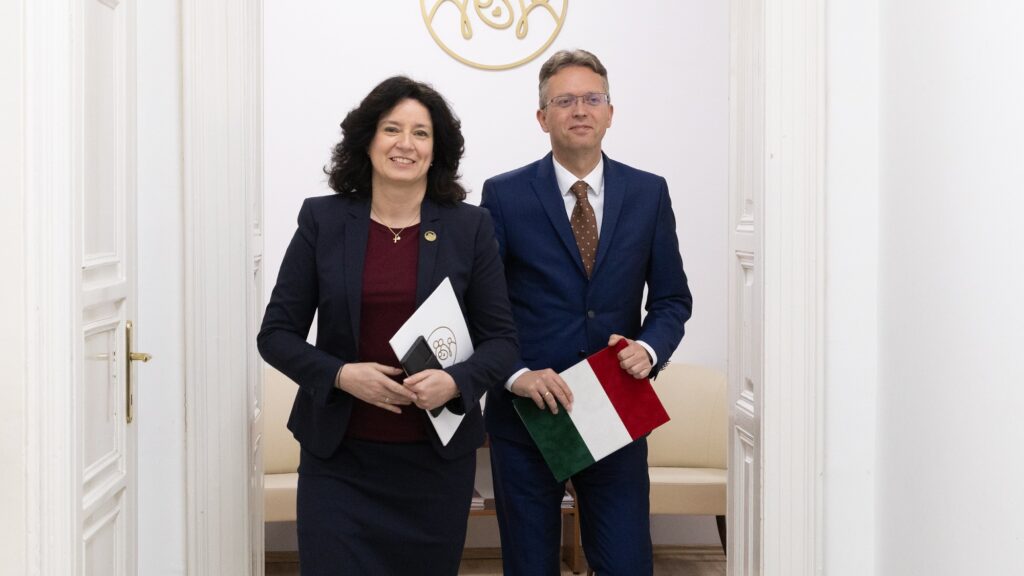The long-expected trade war between the United States and the European Union is escalating after US President Donald Trump announced a 25 per cent tariff on all steel and aluminium imports, declaring ‘no exceptions, no exemptions’. While the decision primarily targets China—given that Washington imports a significant amount of Chinese steel, albeit indirectly—, the tariffs on American steel and aluminium imports will heavily impact the European Union’s economy. President of the European Commission Ursula von der Leyen promised ‘firm and proportionate countermeasures’ on Tuesday.
EU steel exports to the US have averaged about 3 billion euros ($3.10 billion) annually over the past decade, with Germany and the Netherlands being the top exporters from the region. In 2024 alone, Germany exported over one million tons of steel to the US. In a statement, von der Leyen expressed deep regret over Trump’s decision, arguing that tariffs act as taxes that are harmful to businesses and even worse for consumers. However, the commission president did not provide details on the countermeasures, stating that she would first consult with EU member states at a video conference of EU trade ministers on Wednesday.
Ursula von der Leyen on X (formerly Twitter): “I deeply regret the U.S. decision to impose tariffs on European steel and aluminum exports.The EU will act to safeguard its economic interests.We will protect our workers, businesses and consumers ↓ / X”
I deeply regret the U.S. decision to impose tariffs on European steel and aluminum exports.The EU will act to safeguard its economic interests.We will protect our workers, businesses and consumers ↓
One possibility is that Brussels will impose the same retaliatory tariffs it enacted in 2018, when Trump’s first administration introduced the same 25 per cent steel and aluminium tariffs. Those countermeasures included duties on more than $3 billion worth of politically sensitive US exports, such as Harley-Davidson motorcycles and Kentucky bourbon. The European Union also filed a formal trade dispute against Trump’s tariffs with the World Trade Organization (WTO). These measures, along with the US tariffs, were lifted after Joe Biden took office in 2021.
Politicizing Economy Don’t Solve Problems
During a visit to Warsaw last week, Hungarian Minister for Foreign Affairs and Trade Péter Szijjártó criticized the European Commission for politicizing economic issues and failing to make adequate preparations for the ‘new economic world order’. After attending an informal meeting of EU trade ministers, Szijjártó pointed out that Europe is facing severe economic challenges and has lost much of its competitiveness in recent years. However, opinions remain divided on the causes of this decline and the best path forward. ‘The failure and ineptitude of the European Commission over the past five years have made it easy for the United States to impose tariffs on the European Union today,’ he stated firmly, taking a direct jab at von der Leyen and calling her leadership ‘disgraceful’.
While US tariffs on steel and aluminium imports are already hurting the EU economy, which has been struggling to find a path to growth in recent years, this may not even be the worst measure Trump could take. Many EU countries fear that the US president may eventually target the European automotive sector, which is already in a dire state following years of progressive, ideology-driven legislation across Western Europe and the European Parliament, as forced green transitions and overregulated markets have left the industry vulnerable.
‘The failure and ineptitude of the European Commission…have made it easy for the US to impose tariffs on the EU today’
Hungary was the first to address the issue, advocating for measures to boost European competitiveness, which has suffered severe setbacks in recent years. Budapest placed competitiveness at the center of its EU presidency programme, with member states adopting the Budapest Declaration in November 2024, outlining policies aimed at strengthening the bloc’s economic performance. At the time—just three days after Trump’s re-election—Hungarian Prime Minister Viktor Orbán also addressed the possibility of a trade war between the US and the EU, stating that while he expected tough negotiations, the EU could reach a beneficial agreement ‘if we are good enough’.
A Blow to Hungary
If Trump decides to target the EU automotive industry, Germany and Hungary would be among the most affected economies on the continent. Germany’s once-thriving automotive sector has been in decline due to high energy costs and excessive bureaucracy. Additionally, the German Association of the Automotive Industry (VDA) has warned that Germany’s weakening position as an industrial hub is leading to a decline in competitiveness, calling it the ‘fundamental problem’ for carmakers. In a statement, the VDA said the trend of Germany ‘consistently slipping downward’ in global competitiveness rankings was ‘alarming’.
Hungary’s automotive sector is deeply interwoven with Germany’s, as many of the largest German companies have established operations in the country due to its favourable tax policies and investment environment. Speaking at the annual meeting of the German–Hungarian Chamber of Industry and Commerce (DUIHK) at the end of January, Hungarian Minister for National Economy Márton Nagy emphasized that Germany’s economic success is crucial to Hungary’s own prosperity.
‘Germany’s economic success is crucial to Hungary’s own prosperity’
Hungary’s exports to Germany account for 20 per cent of its GDP—the highest rate in the EU. More than half of these exports are vehicles, batteries, and electronic products. Additionally, around 2,400 German-owned companies operate in Hungary, employing over 220,000 people.
Trump frequently cites Brussels’ higher tariffs on vehicles as a major grievance—the EU imposes a 10 percent import tax on vehicles, compared to the US tariff of just 2.5 percent. On top of that, Trump administration officials argue, is Europe’s value-added tax of approximately 20 per cent, effectively raising the total cost to 30 percent. Any US tariffs—particularly if they are structured to match duties imposed on other countries’ automotive sectors, such as China’s—would hit Germany the hardest. BMW, Mercedes-Benz, and Volkswagen accounted for 73 per cent of all EU vehicle exports to the US. It is therefore unsurprising that BMW has urged Brussels to lower its tariffs to match those of the US in an effort to appease Trump.
Breaking the Ice
However, Brussels’ negotiating options appear limited. The Trump administration has largely ignored EU leadership, despite repeated invitations from both von der Leyen and EU foreign chief Kaja Kallas. That being said, the first high-level meeting between top EU and US officials—namely von der Leyen and Vice President JD Vance—already took place today in Paris at the AI Action Summit. However, at the time of writing, no information has been disclosed about what the two discussed.
Ahead of the meeting, Vance delivered a scathing speech criticizing the European Union’s heavily regulated AI sector, arguing that excessive regulation could stifle technological innovation and ultimately kill the industry. Fun fact: the EU has implemented the world’s first AI regulatory framework without having developed any major AI technology of its own. Vance also condemned the EU’s content moderation policies as ‘authoritarian censorship’ disguised as measures to combat misinformation.This, in itself, does not provide a strong foundation for a meeting that will determine the EU’s economic performance in the coming years.
UPDATE:
An Unexpectedly Positive First ‘Date’
Von der Leyen and Vance had a ‘good discussion on our shared challenges as allies,’ according to the Commission president. The two also agreed to cooperate on addressing global overproduction of steel, as stated in von der Leyen’s post on X after the meeting. ‘From security and stability to the great promise of technology and the critical challenge of non-market overcapacity,’ she wrote. Speaking to reporters with a positive tone, Vance stated: ‘The Trump administration has been very clear that we care a lot about Europe.’ He added that the US sees many economic ties to build upon while also emphasizing the importance of the security partnership with Europe.
Related articles:








